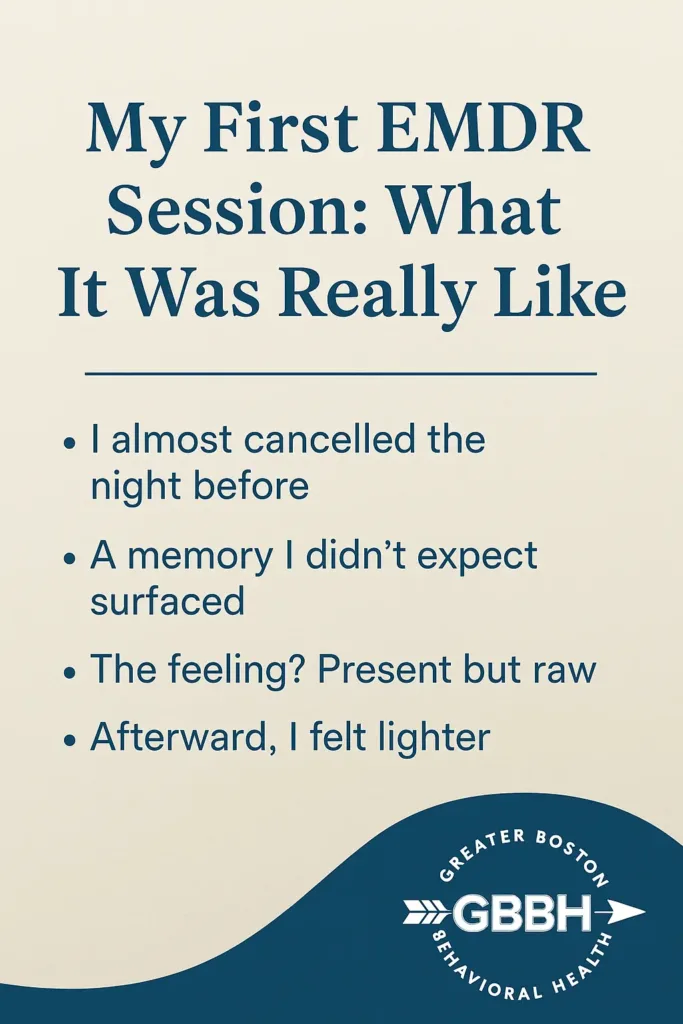I never saw myself as someone who needed trauma therapy.
I didn’t think I had trauma. Not the kind you hear about in documentaries or see in the news.
I was just… tired. Anxious. Snapping at people. Avoiding mirrors. And lately, unable to sleep without my thoughts spiraling.
When a provider first suggested EMDR therapy, I nodded politely but filed it away under “not for me.”
Too intense. Too weird. Too much.
But after getting a diagnosis that left me feeling both seen and overwhelmed, something shifted. I didn’t want to wait another year to feel better. So I made the call.
I Almost Backed Out the Night Before
The night before my first session, I stared at the confirmation email and hovered over the “cancel” button.
What if it made things worse? What if it opened doors I couldn’t close?
I was still trying to wrap my head around the diagnosis. Still wrestling with the idea of medication—worried it might numb me or take away something essential.
Adding therapy on top of that felt like too much vulnerability all at once.
But underneath the fear, there was a quieter voice: What if this actually helps?
So I didn’t cancel.
The Office Was Quiet—But My Mind Was Loud
The next morning, I parked outside the Greater Boston Behavioral Health office and sat in my car for 10 minutes.
Just breathing. Just trying to remember why I was here.
When I walked in, I expected fluorescent lights and clipboard coldness.
Instead, I found soft lighting. A calm energy. A couch that didn’t squeak when I sat down.
The therapist greeted me with a smile that didn’t feel fake. “It’s okay to be nervous,” she said.
She didn’t ask me to spill my trauma story or give a perfect explanation for why I was there. We just talked. Slowly.
What Actually Happens in EMDR Therapy?
Before anything began, she explained the basics of EMDR—Eye Movement Desensitization and Reprocessing.
It’s a mouthful, but here’s what stuck with me: It helps your brain process things it didn’t get a chance to fully sort through the first time around.
She showed me the tools: small buzzers I’d hold in my hands that alternated vibration between left and right. “This helps your brain make new connections,” she said.
No hypnosis. No reliving trauma on a loop. No pressure to say anything I didn’t want to.
We’d move slowly, and I’d stay in control the whole time.
A Memory Surfaced—and It Wasn’t the One I Expected
She asked me to think of a moment that felt emotionally charged—not the worst memory, just something that still held weight.
My mind wandered.
And suddenly, I was back in middle school.
Thirteen. In a hallway. Someone had just called me “too much.” Loud. Dramatic. “You make everything about you.”
I could feel it—the tightness in my chest, the urge to shrink.
The buzzers in my hands pulsed gently. I breathed.
I didn’t cry. But something shifted.
I wasn’t back there anymore—I was here, in this chair, giving my younger self a little space to be seen.
What EMDR Felt Like—In My Body, Not Just My Head
During the session, there were moments I felt spaced out—like watching scenes from my life on mute.
Other times, I felt present but emotionally raw.
Not overwhelmed. Just aware.
Afterward, I was tired in the way you are after a long talk with someone who really gets you.
Not drained. Just… lighter.
I didn’t walk out cured. But I walked out curious—about what else I might be carrying and how EMDR could help me lay it down.
EMDR Helped Me Feel Like My Feelings Made Sense
In the days that followed, I noticed something strange: I wasn’t as reactive.
Things that used to set me off—a sarcastic comment, a skipped text—still stung, but not like before.
I wasn’t spiraling as hard. I had more room to pause before reacting.
And that small shift? It made everything else feel more manageable.
Even the conversations about medication started to feel less terrifying.
I didn’t feel like I was being erased. I felt like I was slowly being returned to myself.
If You’re Considering EMDR Therapy in Boston, You’re Not Alone
If you’re newly diagnosed and scared about therapy—or even scared to feel hopeful again—I get it.
You don’t have to be completely ready. You don’t have to believe 100%. You just have to be curious enough to try.
Whether you’re wrestling with past memories or present overwhelm, EMDR therapy in Boston, MA can offer a gentle way to move forward—without forcing anything before you’re ready. And for those in Needham, Waltham, Newton, or West Roxbury, we have nearby locations to make care accessible.
EMDR Therapy FAQs (What I Wished I Knew Before Starting)
What is EMDR therapy used for?
EMDR therapy is used to help people process and heal from distressing or traumatic experiences. It’s often recommended for PTSD, anxiety, depression, and unresolved emotional pain—even if you don’t think you have “big trauma.”
How does EMDR actually work?
EMDR uses bilateral stimulation (like tapping or buzzing) to help your brain reprocess memories that feel stuck. You stay fully awake and in control, and your therapist helps guide you through the emotional material safely.
Do I have to relive painful memories?
No. You don’t have to relive anything you’re not ready for. EMDR starts slow and centers your comfort. You may notice memories come up, but you don’t need to go into detail unless you want to.
How long does EMDR therapy take?
Some people notice changes after just a few sessions, while others benefit from a longer course of therapy. It depends on your goals, history, and comfort level. Your therapist will move at your pace.
Where can I find EMDR therapy near me in Massachusetts?
Greater Boston Behavioral Health offers EMDR therapy in multiple Massachusetts locations, including:
Final Thought: One Step at a Time Is Enough
You don’t need to have everything figured out.
You don’t need to be fearless.
You just need to be open to one safe conversation, one quiet shift, one surprising memory that doesn’t feel quite so heavy anymore.
That’s what EMDR offered me. Not a miracle—just a moment of clarity I could build on.
Ready to Talk?
Call (888) 450-3097 to learn more about how EMDR therapy in Boston, Massachusetts, can support your healing—one step at a time.


